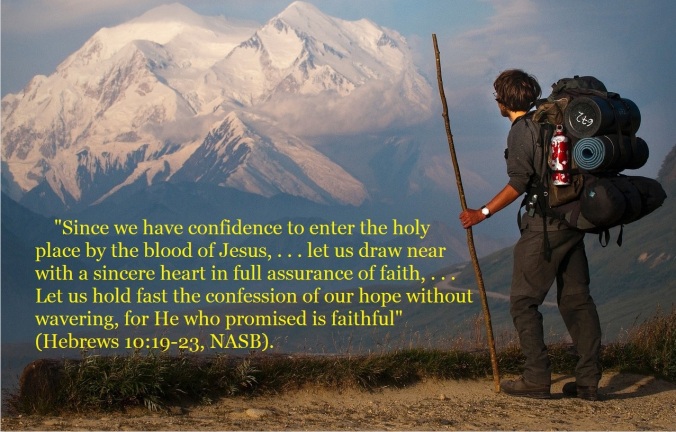“Go therefore and make disciples of all the nations…teaching them to observe all that I commanded you; and lo, I am with you always, even to the end of the age” (Matthew 28:19-20, NASB).
——————–
Contents:
1) Some Marks of God’s People (Virgil Hale)
2) Need: A Pride Killer (Adam Litmer)
3) The Fundamentals (Adam Smith)
——————–

-1-
Some Marks of God’s People
Virgil Hale
Malachi 3:16 reads, “Then they that feared the Lord spake often one to another: and the Lord hearkened, and heard it, and a book of remembrance was written before him for them that feared the Lord, and that thought upon his name.” In this text there are three characteristics given concerning the people of God that I want us to study, and then we will observe the blessing that followed. There are great lessons in this text for all of God’s people today.
In the first place it says that they “feared the Lord.” This in and of itself does not make one a child of God. It is said of Cornelius that he “feared God with all his house…” (Acts 10:2) and that he was “a just man and one that feareth God…” (verse 22). At the time, Cornelius was not a Christian, and he had to obey the Gospel in order to become a child of God. The kind of fear under consideration is not a fear that causes one to shudder at the very thought of God, but it is a reverential awe and respect for God and His will. In speaking of God David wrote, “He sent redemption unto his people: he hath commanded his covenant forever: holy and reverend is his name” (Psa. 111:9). The writer of the Hebrew letter said that we are to “serve God acceptably with reverence and godly fear” (Heb. 12:28). It is evident that most people have little or no respect for God or His Word. According to Solomon, the whole duty of man is to “Fear God and keep his commandments” (Eccl. 12:13). Peter made this statement at the house of Cornelius,”…Of a truth I perceive that God is no respecter of persons: But in every nation he that feareth him, and worketh righteousness, is accepted with him” (Acts 10:34-35). There is no way that one can be a faithful child of God if he has no reverence and respect for God and His will.
Secondly, it is said in our text that these people of God “spake often one to another.” This implies that they had fellowship one with another, that they cooperated one with the other, that they were mutually helpful to each other. The word fellowship carries with it the idea of joint participation. We are told, “And let us consider one another to provoke unto love and to good works (Heb. 10:24). Paul wrote that we are “workers together with him…” (2 Cor. 6:1) and that “we are laborers together with God” (1 Cor. 3:9). The Psalmist wrote, “Behold, how good and how pleasant it is for brethren to dwell together in unity!” (Psa. 133:1). Some things might be pleasant that are not good for us, and some things might be good for us that are not pleasant, but unity is both good and pleasant. Christians are to “Be kindly affectioned one to another with brotherly love; in honor preferring one another (Rom. 12:10). Paul wrote, “Fulfil ye my joy, that ye be likeminded, having the same love, being of one accord, of one mind. Let nothing be done through strife or vainglory; but in lowliness of mind let each esteem other better than themselves” (Phil. 2:2-3). Love for one another lets the world know that we belong to Christ (John 13:34-35). The early church certainly fit this pattern (Acts 2:44-45; 4:34-37).
Thirdly, it is said of God’s people that they “thought upon his name.” This implies that they meditated upon God and His will, and that they were devout worshipers of Him. Do you enjoy studying God’s Word, and are you a faithful worshiper of God? The “Blessed” man of Psalm chapter 1, is one whose “delight is in the law of the Lord; and in his Law doth he meditate day and night.” Paul wrote, “Study to shew thyself approved of God, a workman that needeth not to be ashamed rightly dividing the word of truth” (2 Tim. 2:15). What do you think about most? We are products of our thinking (Prov. 23:7; Rom. 12:1-2). We cannot rise above our thinking!
Finally, notice the results of the preceding, “and the Lord hearkened, and heard it, and a book of remembrance was written before him for them…” Rest assured that God does not forget His people. Paul spoke of people “whose names are written in the book of life” (Phil. 4:3). We need to remember that God has said, “I will never leave thee, nor forsake thee” (Heb. 13:5). Because of that promise we can “boldly say, The Lord is my helper, and I will not fear what man shall do unto me” (verse 6). Rest assured “our labor is not in vain in the Lord” (1 Cor. 15:58). “For God is not unrighteous to forget your work and labour of love, which ye have showed toward his name, in that ye have ministered to the saints, and do minister” (Heb. 6:10). Do we really believe these promises? I hope that we do, because God cannot lie (Tit. 1:2; Heb. 6:18). May we strive to have the characteristics that we have discussed in our lives, and heaven will someday be our eternal home.
— Via The Auburn Beacon, October 16, 2016, Volume 8, Issue 4
——————–
“And my enemy will say, ‘I have overcome him,’ And my adversaries will rejoice when I am shaken. But I have trusted in Your lovingkindness; My heart shall rejoice in Your salvation. I will sing to the LORD, Because He has dealt bountifully with me” (Psalm 13:4-6, NASB).
——————–

-2-
Need: A Pride Killer
Adam Litmer
In Luke 8:40-42 we read, “Now when Jesus returned, the crowd welcomed him, for they were all waiting for him. And there came a man named Jairus, who was a ruler of the synagogue. And falling at Jesus’ feet, he implored him to come to his house, for he had an only daughter, about twelve years of age, and she was dying.”
As a ruler of the synagogue, Jairus was a man of no small influence. However, he found himself in a situation that rendered him powerless. His daughter was dying and there was nothing he could do stop it. All of his influence, wisdom, power, and fame meant absolutely nothing to him in the face of such a terrible predicament. Jesus had many enemies and there is little doubt that at least some of them witnessed Jairus running to Jesus and falling at his feet. There is even less doubt that word of Jairus’ actions spread very quickly. However, whatever pride Jairus may have possessed was crushed beneath the weight of his tremendous need.
A saved relationship with Jesus Christ demands one thing above all else — a humble willingness to admit that one is a sinner, helplessly lost, and completely reliant upon the mercy and grace of One infinitely greater than they (Romans 3:23; 5:1-11). This humility boasts in the cross of Jesus Christ, never in self (Galatians 6:14). This humility boasts in weakness for it is in weakness that the power of Christ shines brightest (2 Corinthians 12:9-10). Is there any wonder, in our increasingly humanistic world, that such humility is rarely seen?
Unfortunately, such humility is not as common as it should be even among those who claim Christ as Lord. It is lacking in the elder who lords his authority over the flock, looking upon the congregation as his own personal fiefdom. It is lacking in the evangelist who forgets that his duty is to present Christ, not himself. It is lacking in the Christian who imagines that his or her salvation will be achieved on the basis of personal goodness.
Need. The word ought to be emblazoned upon the heart of every Christian for the day will never come when the mercy and grace of God is not our greatest need. The one who glories in self has yet to recognize this. When they do, that realization will crush the pride that bars their way to the Lord and salvation.
— Via University Heights Messenger, December 18, 2016, Volume 8, Number 56
——————–
“Pride goes before destruction, And a haughty spirit before stumbling. It is better to be humble in spirit with the lowly Than to divide the spoil with the proud. He who gives attention to the word will find good, And blessed is he who trusts in the LORD” (Proverbs 16:18-20, NASB).
——————–

-3-
The Fundamentals
Allen Smith
It’s impossible to accomplish some things in life until we have mastered the fundamentals. Any sports coach will tell you that a great team has to first be grounded in the fundamentals. Teachers will tell you the same thing about successful students – and the same thing is true about Christians. The fundamentals – the “first principles” – are not always the most enjoyable part, but they are the most essential part of what we need to learn. If we don’t, we may very well be characterized by these words – “For when for the time ye ought to be teachers, ye have need that one teach you again which be the first principles of the oracles of God; and are become such as have need of milk, and not of strong meat. For every one that useth milk is unskilful in the word of righteousness: for he is a babe. But strong meat belongeth to them that are of full age, even those who by reason of use have their senses exercised to discern both good and evil” (Hebrews 5:12-14).
May we be well-grounded in the fundamentals so we can grow up to enjoy the “solid food” found in God’s word.
— Via The Old Hickory Bulletin, 5/4/2014
——————–
The Steps That Lead to Eternal Salvation
1) Hear the gospel, for that is how faith comes (Rom. 10:17; John 20:30,31).
2) Believe in the deity of Christ (John 8:24; John 3:18).
3) Repent of sins (Luke 13:5; Acts 17:30).
4) Confess faith in Christ (Rom. 10:9,10; Acts 8:36-38).
5) Be baptized in water for the remission of sins (Mark 16:16; Acts 2:38; 22:16; Rom. 6:3,4; Gal. 3:26,27; 1 Pet. 3:21).
6) Continue in the faith, living for the Lord; for, if not, salvation can be lost (Heb. 10:36-39; Rev. 2:10; 2 Pet. 2:20-22).
——————–
Tebeau Street
CHURCH OF CHRIST
1402 Tebeau Street, Waycross, GA 31501
Sunday services: 9:00 AM (Bible class); 10 AM & 5 PM (worship)
Wednesday: 7 PM (Bible class)
evangelist/editor: Tom Edwards (912) 281-9917
Tom@ThomasTEdwards.com
http://thomastedwards.com/go (Older version of Gospel Observer website without pictures, but back to March 1990)
http://tebeaustreetchurchofchrist.org/
http://ThomasTEdwards.com/audioser.html (audio sermons)








